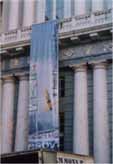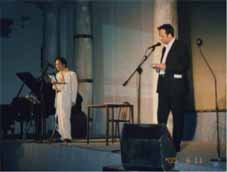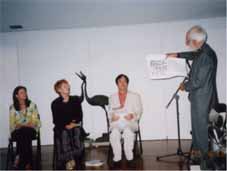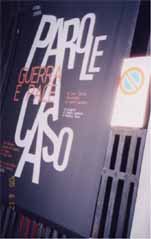From Two Italian Poetry Festivals
Ban'ya NATSUISHI
1.
Language originated with the human voice, and I was able to experience this simple truth at two Italian poetry festivals that I recently had the pleasure of participating in.
The first was the Genoa Poetry Festival, staged this year for the eleventh time, under the auspices of Claudio Pozzani, a poet in his mid-forties known for his great energy. Held over the period of June 10th-17th, the event was attended by poets not only from Italy and other European countries including the U.K., Germany, Spain, and Slovenia, but also from the Asian countries of Thailand, India, and Japan.
Representing Japan were myself and Takaaki Morinaka, who is currently engaged in research in Paris.
The main venues included the Palazzo Ducale and the art museums, located in the central districts of the old port town of Genoa, and since no admission was charged for the event, people were free to stop by at any time.
The main feature of the special atmosphere of the festival was that it was extremely upbeat. I once expressed my feelings about the warm and open tones of the Italian language in the following haiku poem:
In Rome
everywhere oratory
and the full moon
(From the haiku collection “Earth Pilgramage", 1998, Japan)
A ROMA DAPPERTUTTO
ELOQUENZA
E LUNA PIENA
Italian translation by Giorgio Gazzolo
Attending this special event, I felt my description all the more true.
At lunch on the first day of the festival, I read this poem in a promotional event at a local studio for the television station Telecitt . I recited it in Japanese in a relaxed, easy manner, while the Italian Director, Mr. Pozzani, read the Italian translation. The woman MC offered cheery praise for it.
Hailing from various countries, the poets recited their poems in their own languages, followed by Italian translations presented either by the Italian poets or by actors. More so than the original languages, the elegant and cheery sounds of the Italian language lit up every one of the venues, breaking down the barriers between the poets and the listeners to create an atmosphere of excitement. Amongst these, my poem
Squabbling thrushes
this wall lasting
two thousand years
MERLI LITIGIOSI
QUESTA MURAGLIA
DA DUE MILLENNI
had a stunning impact on the listeners. Pozzani recited the piece in a subdued voice, after which the audience became so quiet that you could hear a pin drop.
The lively sound of the Italian language, which formed a striking contrast with my poem, brought a stunned silence to the audience.
2.
The collections I brought for poetry readingc at the event were "Fantastic Italy," a collection of 11 haiku including the above-mentioned "Rome" and "Squabbling thrushes," and the 10 haiku "Ten Flying Popes." I printed and assembled these poems, along with English, French, and Italian translations, into a booklet, which I took with me to Italy.
I made use of the booklet on the evening of the 11th, when the poems were read in four languages including the original Japanese, at the Genoa Museo d'Arte Orientale.
I recited the English and Japanese versions, while a local acquaintance read the Italian and French renditions.
While this poem, noted below, is based on the real-life figure of Pope John Paul II, who recently passed away, it was largely born out of my own imagination, and I believe it got a good response from the people listening, some of whom commented on how the piece was "a deep one."
Flying Pope
visible only to children
and a giraffe
Il Papa volante
visibile solo ai bambini
e alla giraffa
Italian translation by Luca Toma
The other event I attended was the Florence Poetry Festival, staged by the extremely humble gentleman Vittorio Biagine, which this year was held for the third time, beginning June 16th. I began reading my poems on the first evening of the festival at the old garden of Florence University, Giardino dei Semplici. Here I recited the entire "Fantastic Italy" and "Ten Flying Popes" collections.
The following piece got laughter from the audience. Octopus dishes are extremely popular in Italy. I believe I was able to convey something of the pope's carefree nature in this poem.
The Flying Pope's
best friend: an octopus
at the bottom of the sea
Il migliore amico
del papa volante:
un polpo in fondo al mare
Just prior to my recitation, Thong-in Soonsawad of Thailand recited this poem lamenting the tragedy of the tsunami at the end of last year. The audience gave me their attention in anticipation of each of my poems through to the end.
Toward an old woman
sound asleep, tsunami
the Pope flies
Verso una vecchietta
addormentata, lo tsunami
Il Papa vola
It is often said that poetry is prayer, and the poems of Thong-in Soonsawad and I, both from Asian countries, served to prove it.
My poetry reading thus went smoothly. From this experience, I had the good fortune to learn that because haiku is a modern form of poetry, as well as being short―and therefore direct―he meaning and feel of the poems are effortlessly conveyed to general audiences.
●The Japanese original of this report without English and Italian translations of haiku has appeared in the 3 July and 10 July issues of the main Japanese newspaper “Mainichi Shinbun”.




